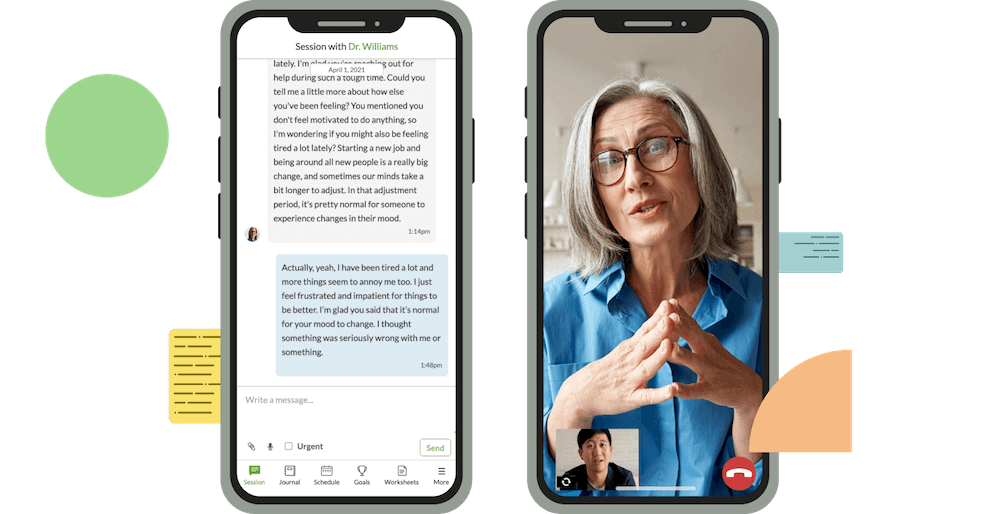Online therapy services with licensed therapists
Online therapy is an effective form of mental health counseling, offering support via internet video calls, chats, and messaging. BetterHelp online therapy has helped millions of people with life’s challenges.


Join the over 4 million people who got help using the world's largest therapy services provider online.







Therapy platforms have helped millions of clients worldwide. Since 2021, four out of ten Americans have used online counseling to meet with their therapist, often due to the convenience, accessibility, and affordability of this treatment option. Therapy sessions can be accessed from home or anywhere with an internet connection. In addition, it allows clients to take advantage of thorough, convenient and affordable mental health services without using health insurance. For those who can’t commute to an appointment with a psychotherapist due to remote location, income insecurity, or a disability—or might just feel more comfortable in their own home— BetterHelp online counseling can allow accessibility that may not be found elsewhere.
Multiple studies have proven therapy services online as effective. One study, accessed in the National Library of Medicine, showcases how cognitive-behavioral therapy with a therapist can effectively treat major depressive disorder and anxiety. The researchers also conclude that it can increase reported quality of life, satisfaction with treatment, and recovery rates. Another study reports that it can be more cost-effective, especially in treating conditions like obsessive-compulsive disorder (OCD).
BetterHelp is the world's largest provider of therapy services online, with over 30,000 licensed, trained, experienced, and accredited psychologists (PhD / PsyD), licensed marriage and family therapists (LMFT), licensed clinical social workers (LCSW / LMSW), and board licensed professional counselors (LPC). Clients at BetterHelp have access to individual, couples, and teen sessions.
BetterHelp therapists are licensed to address a range of challenges including depression, anxiety, grief, panic, anger, abuse, parenting challenges, relationship issues, emotional regulation, panic disorder, eating disorders, and concerns related to trauma during therapy sessions. If you prefer a therapist who has experience with a certain mental health condition or who comes from a specific background, BetterHelp can match you with the right professionals, licensed to practice on the platform, depending on availability.
With our therapists, you get the same professionalism and quality you would expect from traditional therapy with an in-office session, but with the ability to communicate when and how you want using our online counseling platform.


Common types of online therapy
See BetterHelp’s advice articles for more information about the following types of services offered.
Family therapy online
Cognitive behavioral therapy (CBT) online
Solution-focused brief therapy online
Narrative therapy online
Dialectical behavior therapy (DBT) online
Person-centered therapy online
Interpersonal psychotherapy online
Talk therapy online
Couples therapy online
Effective
Many studies have proven that working with a psychotherapist is effective, if not more effective than in-person therapy. One study found that CBT online was as effective as traditional options in treating anxiety, depression, and stress in clients. Another study found that 71% of BetterHelp users found the online counseling telehealth platform more effective and preferable to in-person counseling, feeling that the format allowed them to connect easily with their therapist.
Accessible
BetterHelp online counseling allows you to communicate with your therapist at your convenience from anywhere that has a stable wifi connection. With audio, video, and messaging therapy options, you’re able to communicate with your counselor when and where it works for you, without the added travel required for in-person appointments. If you live in an area without many therapists to choose from, maintain a busy schedule, or don’t have access to reliable transportation, affordable therapy online can remove those barriers making support accessible to you.
Comfortable
With BetterHelp online counseling you’re able to build a relationship with your therapist in your safe space. Online clients often report a more positive therapy treatment experience when working with their counselor virtually. Some people have trouble speaking to a therapist they don't know face to face, and the BetterHelp app allows those who don't feel comfortable interacting in person to have an alternative form of communication that could help them open up.
Private
Privacy is an important concern for many when it comes to using technology for online counseling. With BetterHelp, there is no risk of bumping into someone you know, or discussing your treatment with anyone but your therapist. You also have the option not to use your real name and use an email address that does not directly identify you when you set up your account with us, and you can attend psychotherapy sessions from your own private space. If you'd like to learn more about BetterHelp's business practices and privacy policy, you can read the entire disclosure on our site.
Flexible
It can be difficult for traditional therapy to fit into your schedule if you have a busy lifestyle that makes it hard to find a free hour. With BetterHelp, you can message your therapist any time you need, and they will respond as soon as they’re able, offering you support outside of your psychotherapy sessions. If your match doesn't feel like a perfect fit for any reason, you’re able to switch therapists at any time at no additional cost. All of this contributes to you being able to build a useful and healthy relationship with your counselor during online sessions.
Professional
BetterHelp’s licensed therapists provide the same level of professionalism as you would experience in in-person, with the added benefit of being able to communicate where and when is convenient for you. BetterHelp clinicians are thoroughly vetted before taking clients on the telehealth platform, and many are trained in a wide range of therapeutic modalities that are useful for psychotherapy.


Sending a message to your therapist allows you to communicate thoughtfully and allows the them to formulate a more detailed response. You can also note something you’d like to discuss in your next live session.

Live chat is similar to messaging, except you will receive live responses from your therapist throughout the duration of your session. This can be a great option if you need to take your psychotherapy session someplace that isn’t private, such as a cafe, or if you aren’t yet comfortable speaking through a phone call or video call.

Using the BetterHelp app, you can speak to your therapist through voice calls, which function just like a phone call. This allows for tone and emotions to come through, although you will not see each other’s faces during counseling sessions.

Video therapy sessions are ideal for an experience that is comparable to seeing a therapist in person. Through our high quality video calls, you will be able to see each other’s body language and hear each other’s tone of voice. This type of session is highly recommended as it often provides the most impactful therapeutic alliance with your counselor and can produce the best results.

Getting started with online therapy
-
Get matched with the best therapist for you
- Once you select individual, couples, or teen counseling, you'll answer a few short questions online to find a licensed therapist who fits your needs and preferences. You can be matched by the matching system, or you can choose therapists from the largest network of licensed online therapy providers. If it's not a good fit at first, it's easy to switch clinicians in order to find the best fit at any time.
-
Communicate & help your way
- Once you've been matched with a therapist, you can connect with them in real time or when it works for both of you, however you feel comfortable. BetterHelp users can communicate via phone, text messaging, chat, or video for online therapy sessions.
-
Online therapy when you need it
- You can send a message to your counselor at anytime, from anywhere. You also get to schedule live face to face sessions when it's convenient for you, and can connect from any mobile device or computer during counseling online sessions with your therapist.
Online therapy user reviews of counselors


“My BetterHelp therapist asked the same kinds of thought-provoking questions as the traditional therapists I worked with in the past. (What is it about your future that you’re unsure of? Can you tell me about your old life and what is different now?) Because of the continuing, open-ended nature of the text chat, however, she helped me identify anxiety triggers and coping tools and mechanisms much faster than it would have taken had we only been able to meet once a week. What’s more, I came to find that launching the BetterHelp site on my smartphone or laptop and writing out my thoughts became therapeutic in itself.”

“A lot of the user base that’s interested are people who have never set foot in a therapist’s office,” says Haesue Jo, a licensed psychologist and clinical support lead at BetterHelp, an online counseling provider that provides web-based, phone, video, and text message interaction. “This is a way for people to stick their toe in the water if they’ve been fearful of talking to a therapist before.”

“We’ve heard from our therapists how Coronavirus increased the level of anxiety with their current clients. We’ve also seen a spike in people starting online therapy with us,’ Alon Matas, President of Teladoc’s BetterHelp, told me. ‘The number of new members with concerns of stress and anxiety in February more than doubled vs. February of last year, and this trend is accelerating in March.’ BetterHelp provided free service for clients who have been financially impacted by the outbreak (e.g., layoff or loss of income). The company is offering financial aid for a new client that can cover nearly 50% of the cost. Therapists will still be paid, but BetterHelp will subsidize the loss.”











Frequently asked questions and topics about online & traditional counseling
How much does online therapy cost?
The cost varies by platform. BetterHelp’s monthly psychotherapy subscription plans range from $65 to $100 per week (billed every four weeks) for a weekly phone, video, or live messaging session with a licensed mental health professional counselor and therapist. This pricing for counseling online is more cost-effective than the national US market average of $125 to $199 per session.
Platforms like BetterHelp may also offer extra features and resources, which may not be offered by in-person therapists, increasing the low cost benefit. These options might include group sessions, journaling prompts, and webinar classes. BetterHelp also offers thousands of free articles on mental wellness topics such as anger management, eating disorders, trauma, intrusive thoughts, negative feelings, substance use disorder (formerly referred to as "substance abuse"), exposure therapy, borderline personality disorder, mood swings, psychodynamic therapy, when to seek grief counseling, and more counseling solutions.
How can online therapy with an online therapist help me?
You don’t have to have a mental illness or mental health diagnosis to seek support and counseling - no matter your situation, you can benefit from mental health professionals and counselors. A therapist who works with telehealth services is trained to offer guidance in many areas and may specialize in several modalities and symptoms, and will meet you where you are in your journey. For example, therapists can support clients with depression, anxiety, chronic stress, relationship conflicts, career challenges, bipolar disorder, personality disorders, emotional support, traumatic events, and other topics during counseling sessions. Although some people may feel uncomfortable or worry about reaching out for help due to stigma, trying counseling at BetterHelp can be a great step forward for anyone, regardless of age, gender, sexuality, race, ethnicity, or background.
Research has shown effectiveness of therapy through hundreds of studies and clinical trials. Research shows that it is as effective as in-person psychotherapy. In addition to effectiveness, the BetterHelp app is affordable and offers the convenience of allowing clients to send messages throughout the week and outside of the live video session to receive responses when they are available to speak with a therapist. Online therapy session options may include video and phone calls or live chat on the site, which gives you the control to receive support on your terms.
To understand how other users have felt about an online counseling platform like BetterHelp, it may be helpful to look at past therapist reviews. By looking at the diverse experiences of others highlighted in these online therapy reviews, you can see how it might benefit you.
What are common concerns about virtual therapy with an online therapist?
Some people may worry that their being matched with someone that is not accredited to offer counseling. However, platforms like BetterHelp offer access to licensed, trained, and accredited psychologists, licensed marriage and family therapists, and clinical social workers. Many therapists on the platform have a doctorate, and they all have thousands of hours of clinical counseling experience and supervision.
When a therapist applies to work with BetterHelp, they pass multiple assessments and interviews, including a background check to verify their credentials through their state’s licensing board. Therapists on the platform have at least a master’s degree, 1,000 or more clinical hours of counseling, and three years or more of experience. For this reason, the experienced professional you match with virtually is as credible as one you may find in person, and the vetting process for counseling is already done for you.
Other common concerns with counseling with a therapist may include cost, effectiveness, privacy, and safety. However, this kind of support is cost-effective, effective, and safe when used correctly through a online counseling platform like BetterHelp. Read the statement on privacy policy as well as the Terms and Conditions on our website to learn more affordable online therapy with BetterHelp.
Does insurance cover online therapy and online counseling?
Whether or not the therapy platform you choose accepts insurance may depend on your insurance provider. Private-practice therapists may accept insurance if you find a one that is in your network. However, while often a more affordable option, platforms often do not accept insurance plans. For example, BetterHelp does not accept insurance or partner with insurance providers. However, your insurance coverage plan may offer reimbursement for psychotherapy services you receive.
The MHPA requires employers and others who provide access to group health plans to offer equal benefits for medical and mental healthcare that accept insurance. This means, some major health insurance providers offer reimbursement for these behavioral health services like online counseling with a therapist. You can also use FSA (flexible spending account) or HSA (health savings account) offered through your health provider to save money. Regardless of your mental health history, contact the insurance company's customer service directly or review your benefits list to understand whether your plan offers this option. You may be asked to request a superbill from your provider to submit to your insurance company for any therapy services your received.
Note that reimbursement through your insurance company for services is not at the discretion of the platform you use. All requests and appeals must be made directly with your insurance company, and there may not be a guarantee that they will provide reimbursement for your sessions. If your plan does not cover reimbursement, knowing online therapy is often more affordable than some insurance co-pays and monthly plan costs may be helpful.
Does Medicare or Medicaid insurance cover therapy through BetterHelp online counseling?
BetterHelp is not covered by insurance, including Medicare and Medicaid, which are government-sponsored health insurance plans, however, BetterHelp does offer affordable therapy with payment options from $65 to $100 per week, billed monthly or weekly. This plan covers a weekly 30-45 minutes long therapy appointment plus access to one group session. Before choosing a provider, it's important to ask your insurance provider questions like, "Does my insurance cover sessions with a therapist?" and "What can I do if the telehealth counselor doesn't accept insurance?" Insured members may find the contact information for your insurance on the back of your health insurance card.
Does BetterHelp offer free online therapy?
According to American Psychological Association, expensive costs of therapy is often the reason people do not seek support. While BetterHelp does not offer free therapy, it might be the best affordable option. As the leading global therapy provider, they employ a large, dedicated team of therapists and contract with thousands of licensed psychologists to provide convenient, accessible, and affordable counseling. Being able to offer affordable care comes at a cost, and therapists make their living through the cost of the weekly subscription plan. However, costs can come down if you qualify for a temporary lower rate for these services.
Free therapy programs may be available to those who qualify through your city's human services department. The U.S. Department of Health and Human Services also offers services for parents. To find out if you can save money on counseling with a BetterHelp counselor, take the financial need survey or email contact@betterhelp.com to learn more. Additionally, look to see if your company offers BetterHelp access through an Employee Assistance Program (EAP), or if your university offers BetterHelp to students.
Is an online therapist effective or as effective as in-person health care services?
Multiple studies have found that these services are as effective as in-person sessions, with some showing that a platform like BetterHelp's is more effective. For example, in a study conducted in eClinicalMedicine, researchers examined 17 studies on the effectiveness of CBT therapy online in treating depressive disorders. The study results demonstrated that virtual CBT could be more effective than face-to-face CBT in reducing symptom severity and that it was more cost-effective.
Online therapy may also be as effective as in-person options in different settings, such as couples sessions with a partner through platforms like Regain that helps people in relationships. One online therapy review found that couples preferred this service due to the enhanced connection within their relationships and the ease of videoconferencing sessions. Participants in couples counseling online also reported a greater sense of comfort and control over their experience. No matter the method you choose, therapy is has been proven to increase happiness and improve lives through learned coping skills and other treatment methods. Schedule a consultation with a licensed expert on the platform to begin; whether you're looking for support for adults, teens, or partners in a relationship. Doing so can benefit the behaviors of anyone from adults to children.
How are the therapists on this online therapy platform verified for my benefit?
Therapists on BetterHelp are licensed, trained, experienced, and accredited psychologists (PhD / PsyD), licensed marriage and family therapists (LMFT), licensed clinical social workers (LCSW / LICSW), or licensed professional counselors (LPC). All of these psychology professionals have a Masters Degree or a Doctorate Degree in their field, and follow the APA Code of Ethics. They have been qualified and certified by their state's professional board after successfully completing the necessary education, exams, training and practice with a patient. While their experience, expertise, careers, and background vary, they all possess at least 3 years and 1,000 hours of hands-on experience, and have the necessary credentials to provide therapy.
Our team ensures that every therapist we bring to the BetterHelp counseling platform is fully licensed and in good standing, and follows all guidelines required. Any who apply are required to provide proper licensure documentation and proof of identity. We then cross-check their licensure information with their respective state licensing board.
In addition to checking licenses, each potential therapist needs to complete a case study exam graded by a licensed clinician and be evaluated in a video interview. The result of this longer rigorous process is that only about 25% of applicants who apply to offer counseling through BetterHelp are accepted to the therapy platform, and once they begin working on the platform, they are evaluated often to ensure they are upholding a high standard.
We also show the full licensing information to make it easier for you to do your own due diligence before you start counseling. Keep in mind that while some of the therapists are licensed psychiatrists, we do not offer psychiatry to members on the BetterHelp platform. If you are looking for a psychiatrist that does not require in-office care, we encourage you to explore and research other options.
How often you attend therapy depends on your preferences and how you prioritize your mental health goals. Some people prefer sessions every other week, whereas others require more frequent support and might have counseling check ins a couple days a week.
Some people who see a licensed therapist, whether in traditional in-person or via affordable online therapy platforms, have a face to face therapy session once a week. A weekly session can allow a steady pace of communication, with healthy reflection between sessions. Through a platform like BetterHelp, you can also send text messages throughout the week, receiving text based support in addition to your weekly 30-45 minute sessions.
BetterHelp subscription plans include one weekly live 30-45 minute counseling session and messaging with your therapist. If you want more than one session a week, you can request one, and the mobile app or website can notify you how much the extra session may cost and whether it’s available. Some BetterHelp users also sign up for one weekly group session, which functions as a support group led by a licensed professional. You can schedule one weekly group session in addition to your weekly individual counseling session. You can also pay a fee for more than one group session per week. When considering frequency of affordable therapy sessions, insurance coverage may be a factor: if the service you are using takes insurance, the amount of sessions covered may vary.
Can online therapy services offer treatment by prescribing medication?
Licensed BetterHelp therapists do not prescribe medications, or provide psychiatry and medication management services to therapy clients.According to the American Psychological Association (APA), the only professionals who can prescribe medication for specific mental health conditions are psychiatrists, psychiatric nurse practitioners, prescribing psychologists (in some states), and other medical doctors (MDs); which is not what you should expect from the BetterHelp therapist service. It's important to note that these professionals and counselors must be licensed in the state where they practice to prescribe medication or offer medication management treatment plans, and are subject to other licensing requirements.
Schedule a consultation with your primary care physician or doctor for further guidance on medication management or before starting, changing, or stopping any medication or medical treatment.
Why do people believe that online counseling is the best based on research?
BetterHelp online counseling supports clients worldwide with common conditions and life challenges by connecting them with a therapist. Because BetterHelp is cost-effective, accessible, and flexible, it is often a viable alternative to traditional in-person, in-office therapy. In addition, clients may enjoy membership benefits, like daily journaling prompts, weekly classes, optional group sessions, and messaging. BetterHelp, under parent company Teladoc Health, is the leading therapy platform worldwide for the cost and range of services offered, and has been ranked as the best service by multiple publications.
Once you sign up for your BetterHelp membership and are matched to a therapist, you will get a room which will be your personal and secured place to communicate. In this room, you will share about your current situation, the problems going on in your life, thoughts that may trouble you, ask questions and discuss the issue that you would like to focus on during your sessions. This acts as an initial assessment or initial consultation for counseling, allowing you to be intentional about what outcomes you'd like to see from attending sessions. This also helps develop an ongoing treatment plan with recommendations to get you there.
Your therapist will then read your messages, share with you their unique approach to psychology, and respond with questions, feedback, insights, resources, and tools guide you towards the wellness results you're looking for. You may also be asked to complete worksheets so that your therapist can get to know you better beyond your counseling sessions.
It's easy to speak to your therapist through your preferred communication type. Here are the methods available on both mobile and desktop:
- Messaging with a counselor
- Chatting live with a counselor
- Speaking over phone calls with a counselor
- Video conferencing with a counselor
You can use different ways to communicate during counseling sessions at different times as you prefer, based on your needs, availability, and convenience. You can send messages to your therapist at any time, from any location, using any connected device. You can log in to your room at any time and since messaging is not in real-time it doesn't require scheduling. Instead, you can choose whenever you want to write or respond to your therapist. You will get a notification by email when you have received a return message.
You can also have live video sessions, where you meet each other and talk with each other using technology (similar to Skype or Zoom). To talk with your counselor via video, you will need to schedule appointments and log in to your therapy room at that specific time. Your therapist will then prompt you to start the video session. After you confirm, you will immediately begin video chatting.
There's no pressure to stick with the first therapist you've been matched with. If you decide it's not a good fit after the first consultation and counseling session, or there is limited availability on the day you prefer, simply switch at any time by selecting someone else. This flexibility is part of your paid membership with no hard feelings.
How does scheduling therapy appointments online work?
A live session (by either chat, phone, or video)with a therapist can be scheduled in two ways:
While in a respective client's Sessions Page, they can book a telehealth session in the Schedule section. The therapist should discuss and coordinate the date and time with you beforehand, versus scheduling a time without consulting with you first. For your convenience, if you are in a different time zone, the technology allows for the you both to see the times in both time zones for the online counseling session.
You can schedule live counseling visits once you click on an available time slot. The therapist can set the time slots in which they are available for a live session using the "Scheduling" tab of the dashboard. We do inform patients that if they don't see a day/time that works, to send a message to see if there is a way to open up additional timeslots.
Either way, when a live therapist session is scheduled, confirmation and reminder emails will be sent out. From there it is easy to cancel a session that was scheduled if needed.
In addition, there is a feature under the Help tab called “Video session test.” This feature will run a test of your device to make sure it’s ready to go for a live video session. There are other tools and resources here to ensure you have the best connection possible during your session.
Having issues? Reach out to BetterHelp directly at contact@betterhelp.com for any questions or issues you might have regarding the billing process, your account, payments, your therapist, or anything else related to working with a therapist on our counseling platform.
What should I do to prepare for online therapy with a therapist?
It's a good idea to read about what you might expect before you start with a telemedicine provider and therapist. Here are a few articles and links to get you started:
Online Premarital Counseling With A Telehealth Therapist
Alternative Options For Anxiety
Psychology Vs Psychiatric Care
Do I Have A Social Media Addiction?
What are the pros and cons of an online counseling app?
If you haven't used telemedicine before, the idea of receiving this care and support might be daunting. Know that starting counseling, whether you're looking for online or in person sessions, is a great step toward improved mental health and wellness. Millions of people in the United States and around the world have received life changing evidence based therapy through telehealth platforms. Here are some of the pros and cons to consider related to affordable online counseling:
- Access from your home, without the added travel to in-person visits
- Attend sessions through message, voice calls, or video calls
- Communicate outside by sending messages at any time
- Change therapists easily whenever you want
- Find a therapist who has experience in a less common modality
- Is as effective as in person therapy
- BetterHelp offers over 34,000 counselors to choose from
- If you're in a rural area, you may get greater access through an online service
- Detailed privacy policy
- In some cases, access to mental health tests
- Insurance providers may not cover services through telehealth platforms offering a mental health service
- May not be a good fit for those in crisis situations; please seek immediate support if you are in crisis (emotional or otherwise)
- May not be appropriate for serious illnesses
- Does not provide the same in-person interaction that traditional consultations do with recurring office visits with a clinical psychologist
- Psychiatry may not be offered by counselors
Who should not use a counseling & therapy platform?
If you are experiencing a crisis or severe mental health emergency, or any other person may be in severe danger, please do not use this site. Reach out to crisis services unaffiliated with BetterHelp:
- National Domestic Violence Hotline: 1-800-799-SAFE (7233)
- 988 Suicide Lifeline: Call or text 988 for support
- Veterans Crisis Line: Call 1-800-273-8255 (and press 1) or text 838255. For support for the deaf and hard of hearing community, please use your preferred relay service or dial 711 then 1-800-273-8255
- Trevor Lifeline (LGBTQIA+ Community Lifeline): (866) 488-7386
- SAMHSA National Helpline (Substance Use): (800) 662-4357
- National Eating Disorder Association Helpline: 1-800-931-2237 (M-Th: 9 AM to 9 PM EST, Fri 9 AM to 5 PM EST)
- Child Help Hotline: Call 1-800-422-4453 or use the online chat feature
- National Anti-Hazing Hotline: 1-888-NOT-HAZE (1-888-668-4293)
- Physician Crisis Support Line: Call 1-888-409-0141 if you are a first responder or medical provider experiencing crises related to COVID-19
- Sexual Assault Hotline: Call RAINN at 1-800-656-4673
- BlackLine: Call 1-800-604-584 for peer support if you are a Black American experiencing a mental health crisis
Is therapy effective, and what research or evidence proves that online counseling works?
Science shows that online therapy works. In fact, several studies have proven it's effectiveness when working with a counselor. Here are a few examples of research on the topic:
-
- Internet-based and other computerized psychological treatments for adult depression: A meta-analysis. - Source
- Andersson, G., & Cuijpers, P. (2009).Cognitive Behaviour Therapy, 38(3): 196–205.
- Is guided self-help as effective as face-to-face psychotherapy counseling for depression and anxiety psychological disorders? A systematic review and meta-analysis of comparative outcome studies. - Source
- Cuijpers, P., Donker, T., van Straten, A., Li, J. and Andersson, G. (2010). Psychological Medicine, 40(11): 1943–1957.
- Computerised cognitive behavioural therapy for depression and anxiety update: a systematic review and economic evaluation. - Source
- E Kaltenthaler 1, J Brazier, E De Nigris, I Tumur, M Ferriter, C Beverley, G Parry, G Rooney, P Sutcliffe (2006). Health Technol Assess. 2006 Sep;10(33):iii, xi-xiv, 1-168. doi: 10.3310/hta10330.
- Internet-based treatment for Post Traumatic Stress Disorder: A randomized controlled trial comparing clinician-assisted to self-administered PTSD treatment. - Source
- Knaevelsrud, C. and Maercker, A. (2007). The Journal of Clinical Psychiatry, 68(11): 1675–1683.
- The effect of mindfulness-based therapy on symptoms of anxiety and depression in adult patients: A meta-analysis. - Source
- Piet, J. and Hougaard, E. (2011). Clinical Psychology Review, 31(6): 1032-1040.
- Internet-based cognitive behaviour therapy for symptoms of depression and anxiety: A meta-analysis. - Source
- Spek, V., Nyklí?ek, I., Smit, F. and Cuijpers, P. (2007). Psychological Medicine, 37(3): 319–328.
- Virtually-Delivered Cognitive Behavioral Therapy to Treat Insomnia: A Systematic Review and Meta-Analysis. - Source
- Michael Seyffert 1 2 3, Pooja Lagisetty 2 3, Jessica Landgraf 3, Vineet Chopra 2 4, Paul N Pfeiffer 1 4, Marisa L Conte 5, Mary A M Rogers 2 (2016). PLoS One. 2016 Feb 11;11(2):e0149139. doi: 10.1371/journal.pone.0149139. eCollection 2016.
- Impact on weight loss - Development and effects of a health promotion program utilizing the mail function of mobile phones. - Source
- Akio Kubota 1 , Makoto Fujita, Yoshiro Hatano. Nihon Koshu Eisei Zasshi. 2004 Oct;51(10):862-73.
- Smoking cessation support delivered via mobile phone text messaging (txt2stop): a single-blind, randomised trial - Source
- Dr Caroline Free PhD, Rosemary Knight RGN, Steven Robertson BA, Robyn Whittaker MPH, Phil Edwards PhD, Weiwei Zhou MSc, Prof Anthony Rodgers PhD, Prof John Cairns PhD, Prof Michael G Kenward PhD, Prof Ian Roberts PhD. Volume 378, Issue 9785, 2–8 July 2011, Pages 49-55
- Internet-based and other computerized psychological treatments for adult depression: A meta-analysis. - Source
Teletherapy techniques used by licensed therapists, with a focus on being compliant with healthcare standards, have the goal of providing specialized consultations for issues ranging from ADHD to addiction. Whether it is an adult, child or teen getting the personalized care they need… evidence-based practices like EMDR psychotherapy, or cognitive behavioral therapy can help people get the support they need to manage sleep issues, relationship concerns, and other personal challenges in life.
In addition to using EMDR and cognitive behavioral therapy, licensed therapists at times use a range of specialized teletherapy techniques. These methods can be adapted for online sessions to address a variety of issues effectively.
Cognitive Behavioral Therapy (CBT) - CBT in online counseling is particularly effective for ADHD, sleep issues, and anxiety, focusing on identifying and altering negative thought patterns through interactive sessions and digital resources. CBT counseling involves a clinician working closely with clients during therapy visits to develop practical skills for managing daily challenges. Try CBT therapy with a therapist today.
Dialectical Behavior Therapy (DBT) - DBT is adept at helping individuals with addiction and emotional regulation, utilizing online sessions for mindfulness training and coping strategies, reinforced with accessible digital materials. In DBT counseling, the therapist provides a structured framework to help clients build resilience and emotional stability as result of therapy sessions. Try DBT therapy with a therapist today.
Humanistic Therapy - This approach in the online setting offers profound benefits for personal growth and relationship concerns, with therapists facilitating self-exploration and empathy through video or audio sessions. This humanistic approach emphasizes a client-centered approach, where the therapist helps individuals realize their full potential during therapy visits. Try humanistic therapy with a therapist today.
Family Therapy - Tailored for online delivery, this type of therapy effectively addresses family dynamics and communication issues, making it ideal for geographically dispersed families through video sessions. Family therapy via online counseling focuses on enhancing understanding and cooperation among family members, guided by an experienced and licensed professional. Try family therapy with a therapist today.
Solution-Focused Therapy - Ideal for addressing immediate life challenges, this practice focuses on goal-setting and strategy development in a concise online format, providing practical solutions for work-related stress or life transitions. Solution-focused therapy and counseling involves a clinician helping clients to identify and achieve their personal and professional goals within a reasonable amount of time. Try SFT therapy with a therapist today.
Interpersonal Therapy (IPT) - Online IPT is effective for improving interpersonal relationships and communication skills, especially in resolving relationship issues through structured exercises and role-playing during therapy sessions. In IPT counseling, clients are assisted with in developing healthier ways to communicate and interact with others. Try IPT therapy with a therapist today.
These therapies ensure that whether it's an adult, child, or teen, everyone receives personalized and effective care for a range of issues, from managing sleep disturbances to navigating complex personal challenges. Each counseling approach is facilitated by a licensed therapist who specializes in tailoring their methods to suit the unique needs of each client during their therapy sessions.
What are benefits and costs of affordable online therapy?
Therapy platforms like BetterHelp can provide you with a number of benefits like the flexibility to work with different accredited professionals and a therapist to find the best affordable therapy for you. Having access in this way via a therapy app like BetterHelp can provide the ongoing support needed for improved mental health care and wellness, progressing at your own pace. Therapy costs and fees (which are generally cheaper and a low cost option) are clear and transparent as it relates to any subscription fees that connect you with available and accessible mental health counselors.
During in-person sessions with a therapist, progress can be influenced by things like face-to-face interaction; which in some cases can be beneficial but that is not always the case. Virtual therapy, on the other hand, provides options that offer the flexibility and comfort of engaging from your own preferred environment. Despite these differences, many people have made positive progress with virtual teletherapy.
Are online therapy services convenient and affordable effective mental health care?
One of the things that makes the best online therapy services convenient is that users can access care from anywhere, which is most helpful for people that do not have access to a traditional in-person healthcare center. Additionally, this kind of therapist service has competitive (and in many cases cheaper) fees than traditional solutions that lack the affordability that many people are looking for.
Online therapy providers comparison. BetterHelp, Regain, and Talkspace
BetterHelp therapy |
Talkspace therapy |
Regain therapy |
|
| Number of therapists | 30,000+ | Not specified | Not specified |
| Therapist Qualifications | LCSW, LPC, LMFT, PsyD | LCSW, LMFT, LPCC, or PhD in Clinical Psychology. | LCSW, LPC, MFT, PsyD |
| Messaging Therapy | 7 days per week | 5 days per week | 7 days per week |
| Live Chat Therapy or Text Therapy Sessions | Yes | Yes, may be an additional cost | Yes |
| Phone Therapy Sessions | Yes | Yes, may be an additional cost | Yes |
| Live Video Therapy Sessions | Yes | Yes | Yes |
| Live Sessions Length Limit | 45 minute therapy sessions | 45 minute therapy sessions | 45 minute therapy sessions |
| Sessions Booking |
Choose therapy availability based on a calendar, no confirmation needed |
Choose therapy availability based on a calendar, therapist confirmation required
|
Choose therapy availability based on a calendar, no confirmation needed |
| Matching To Therapist Options |
Matching algorithm or choose your therapist from a list - change at any time |
Matched by algorithm |
Matching algorithm or choose from a list - change at any time |
| Digital Worksheets | Yes | No | Yes |
| Journal | Yes | No | Yes |
| Interactive Group Therapy Sessions |
Yes, 1 included per week plus more available at extra cost |
No |
No |
| Self-Help Content | 4,000+ articles and mental health resources | Blog content | 2,000+ articles on mental health information |
| Showing "Therapy Timeline" | No | Track progress in app | No |
| Psychiatry Option or Medication Management | No |
Yes |
No |
| App Store Rating | 4.8 | 4.8 | 4.7 |
| Google Play Store Rating | 4.6 | 4.4 | |
| Payment Commitment |
Month-by-month default with option to change to week-by-week or quarter-by-quarter |
Month-by-month, quarter-by-quarter, or semi-annually | Month-by-month default with option to change to week-by-week or quarter-by-quarter |
| Monthly Cost |
$260 to $400, Depends on location and includes a weekly live therapy session |
$396 per month, costs may vary |
$260 to $400 per month |
| Billed Weekly or Monthly |
Monthly |
Both available |
Monthly |
| Financial Aid Plan Options | Yes | No | Yes |
| Payment Options | Credit card, PayPal | Credit card | Credit card, PayPal |
| Accepts Insurance |
Options available Some FSA/HSA providers, some employers, some EAPs, some universities |
Options available Some insurance plans, FSA/HSA providers, employers, EAPs, universities |
Options available Some employers, some EAPs, some universities |
| Counseling options available |
Individual therapy, Couples therapy, Teen counseling |
Individual therapy, Couples therapy, Teen therapy, Psychiatry/Psychiatric care |
Individual therapy, Couples therapy |
Multiple publications have listed BetterHelp as the #1 best psychotherapy service to connect with a licensed therapist. For more information about BetterHelp’s services, features, and licensed providers, visit the main FAQs section. If you have specific questions about the therapy experience with BetterHelp, please use the contact page to send the customer success team a message.
How do cognitive-behavioral, dialectical behavior, humanistic, family, solution-focused, and interpersonal therapy differ in their therapeutic approach?
Each of these therapy techniques have a specific focus: cognitive-behavioral therapy targets changing negative thoughts, dialectical behavior therapy emphasizes emotional regulation, humanistic therapy promotes personal growth, family therapy addresses family dynamics and relationships, solution-focused therapy concentrates on finding specific and immediate solutions, and interpersonal therapy explores personal interactions and communication. These differences can help in selecting the best therapy approach for an individual’s needs and specific situations with the help of a therapist.
How does online therapy complement other health and wellness practices like yoga or meditation?
Online therapy with a licensed therapist, when combined with health and wellness practices such as yoga or meditation, can provide a holistic approach to mental health therapy, enhancing overall well-being. This combination can lead to more comprehensive therapy outcomes, addressing both mental and physical health concerns.
Do therapeutic options vary across different life stages like young adulthood, midlife, or senior years?
Yes, therapy often adapts to each life stage's unique challenges. For young adults, it might focus on career and relationships; in midlife, it often addresses existential issues; and for seniors, it can help with life transitions and coping with loss. Therapy provides tailored support from a therapist throughout these and other varying life stages.
How does therapy help with life events such as grief, career changes, or relationship issues?
Therapy offers targeted support for different life events: grief therapy for processing loss, career-focused therapy during job transitions, and therapy for relationship issues to aid in healing and growth. The effectiveness of therapy depends on the individual's needs, the experience of your therapist, and the specific therapy approach used.


Online therapy is personal

Does health insurance cover online therapy or do I have to pay? Service costs and options
"Insurance benefits can cover psychotherapy sessions in certain cases. Each health insurance plan may have different mental health coverage options for mental health treatment. Some insurance companies may not cover certain online therapy services, price points, or pre-existing conditions. Discussing your mental health benefits with your insurance provider can help you find the best-suited and most affordable solution for your needs. If you have a primary care physician, they may also help refer you to a specialist that takes your insurance plan, as not every therapist accepts insurance..."
Medically reviewed by Dawn Brown, LPC Counselor
How much does online counseling with a therapist cost?
"Paying for an online psychologist, or online therapy sessions can present a significant challenge for many individuals. There are numerous routes you can take in finding an effective mental health provider, and it can feel challenging to know which one to choose and how to envision the long-term process psychotherapy when it comes to cost..."
Medically reviewed by Melissa Guarnaccia, LCSW Counselor
How to find the best virtual therapist near me & other types of therapists?
"Finding the right therapist that matches your needs can be challenging, particularly if you live in a rural area or if you require an in-network service that takes insurance with a copay. The factors you may consider include cost, distance, specialty, and preferences when looking for psychotherapy treatment in your area. Here are the ways you can get started with online therapy in your search..."
Medically reviewed by Melissa Guarnaccia, LCSW Counselor
Online therapy reviews
"These quotes represent a few of the many positive online therapy reviews that we have received for BetterHelp. We don’t pay anyone to provide their review and they are all made voluntarily. Some people's psychotherapy experience with BetterHelp might be different. If you would like to review your therapist, please send your review to contact@betterhelp.com."








